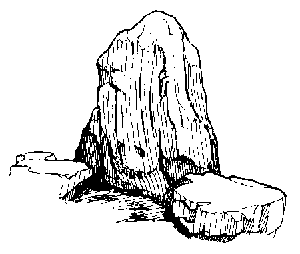|
Destructive Symbolism
by Douglas M. Roth (first published in Mar'01)
 JOJG readers have probably noticed that the term
“symbolism” rarely appears on the pages of this publication. We can’t avoid
the word completely, but we generally use it as little as possible.
JOJG readers have probably noticed that the term
“symbolism” rarely appears on the pages of this publication. We can’t avoid
the word completely, but we generally use it as little as possible.
Why? Simply put, we avoid the term “symbolism” because it does more harm than good. It’s one thing to say that a garden represents the beauty of the natural world. It’s quite another thing to say that a rock symbolizes the center of the universe, or flying dragons, or some other nonsense.
Many public gardens pass out brochures that offer all kinds of stories in the name of symbolism. Certainly you’ve heard some of them: Islands that “symbolize” turtles and cranes; 3-stone groupings that “symbolize” Buddha; Bridges that “symbolize” the journey to heaven.
Much of it is just nonsense. Why is it that people have such a hunger for
myth, superstition, and symbolism? Are tourists that eager to be
entertained? Or are they merely passive victims?
The obvious danger in blurting out “this symbolizes such and such” is that
some people will believe it. But misguided stories distract even sensible
guests. After all, who could notice a garden’s subtle grace while listening
to tales about devils and wizards?
I understand the important role symbolism plays in literature and other arts. Such is not the case here, where myth-makers are simply trying to make their gardens seem exotic and interesting. And they succeed. So much so, in fact, that reasonable people can become confused or just plain irked. One fellow once told me, “Japanese gardens? I went to one of them once, and every rock had to symbolize something. Each rock had a name and had to be positioned just so. It was all just too weird for me. You can have it.”
His words illustrate how symbolism poisons Japanese gardening. After all, what’s wrong with appreciating a rock merely because it is handsome? Does it have to have a story to justify itself? Why does a bridge have to symbolize anything?
One of my favorite quotes is attributed to the tea master,
Murata Shuko:
A fine horse,
standing by a straw-thatched house,
is a very beautiful scene.
That’s true, isn’t it? We can find health, beauty, and, indeed, spiritual
value in very simple things. There’s no need to make up foolish stories.
---------------------------------------------------------
ZEN GARDEN Check out this link for some surprising information about this often (mis)used term.
